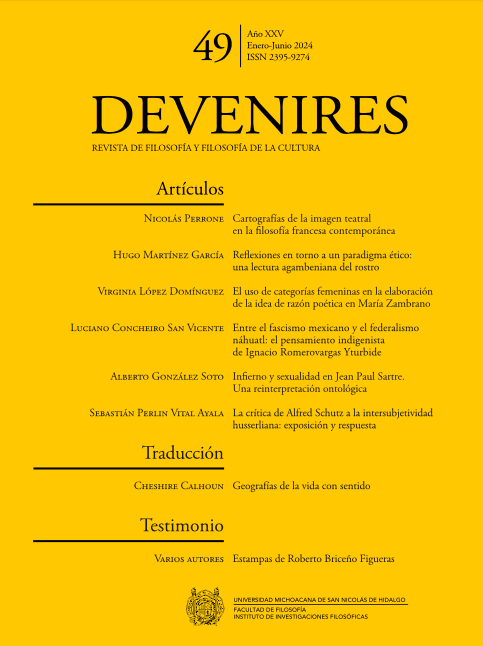Hell and sexuality in Jean-Paul Sartre. An ontological reinterpretation
DOI:
https://doi.org/10.35830/devenires.v25i49.941Keywords:
love, conflict, interpersonal relations, being-withAbstract
The topic of sexuality is controversial in public debates where it is difficult to accept or take anything for granted. In philosophical analysis little interest has been invested in such considerations and they are relegated more usually to cultural, social or anthropological debates. This paper reviews the brief ontology of sexuality developed by Jean-Paul Sartre in his work Being and Nothingness; the subject is limited to his reflections on primordial relationships with a neighbor. Following up on the rereading made in a related work regarding the problem of interpersonal relationships in Sartre’s reflections, the present aim is to reinterpret the theme of sexuality beyond sadomasochistic limits, and to establish some references to discuss the issue on ontological foundations. The results lead to understanding sexuality as a pre-ontological condition in relation to being-before the other, a requirement for the three ontological elements of the human being to be possible: the body in-itself, which is a biological corporal basis; the body for-itself, as the foundation of human identity; and the body for-the-other, rooted in interpersonal interaction. Moreover, these fundamental components are identified as inscribed in the formative context of being-with.
References
Bolufer Peruga, M. (2008). Las mujeres en la cultura de la ilustración. En Martínez R., Enrique, De Pazzis p. C. M (eds), Ilustración, ciencia y técnica en el siglo XVIII español. España: Universitat de Valencia.
Castellanos R, B. (2010). El erotismo como fascinación ante la muerte, según Georges Bataille. En Nómadas. Critical Journal of Social and Juridical Sciences. Vol. 26, núm. 2.
Copleston, F. (2000). Historia de la filosofía. Vol. 9. España: Ariel.
Fabelo Corzo, J. R. (2018). Antecedentes evolutivos de los valores estéticos. En Historia natural del arte y evolución de la cognición. Colección La Fuente. México: BUAP.
Foucault, M. (1991). Historia de la sexualidad. 1. La voluntad de saber. México: Siglo XXI.
González Soto, A. et al. (2022). ¿Al reencuentro de un guía? Actualidad del pensamiento de Jean-Paul Sartre. México: Letras del Lobo.
González Soto, A. (2023). El problema del infierno y los otros. Jean Paul Sartre frente a la pandemia. En: Ciencia y Mar. Vol. 27. Núm. 79.
Logatt G, C. (2015). Neurobiología del deseo y del placer. Web: https://psicopedia.org/wp-content/uploads/2015/07/neurobiologia-deseo-placer.pdf
Marcuse, H. (1983). Eros y Civilización. España: Sarpe.
Margulis, L. (1998). ¿Qué es el sexo? España: Tusquets.
OMS. (2002). Sexualidad. Temas de Salud. Web: https://www.who.int/es/health-topics/sexual-health
Puleo, Alicia H. (2007). Dialéctica de la sexualidad. Género y sexo en la filosofía contemporánea. España: Titivillus.
Sartre, J. P. (1998). El ser y la nada. Argentina: Losada.
Sartre, J. P. (1980). Jean Paul Sartre: No somos hombres completos. En: El País, abril 18, 1980.
Sartre, J. P. (1968). La trascendencia del Ego. Ediciones Calden.
Savater, F. (1986). Savater reclama a los filósofos que se ocupen del sexo. En: El País, agosto 27, 1986.
Torres N. A. (2022) Ubuntu: la filosofía africana del cuidar del otro. Centro de Ciencias de la Complejidad. México: UNAM. Web: https://www.c3.unam.mx/noticias/noticia217.html
Vargas-Trujillo, E. (2013). Sexualidad… mucho más que sexo: una guía para mantener una sexualidad saludable. Colombia: Universidad de los Andes.
Downloads
Published
How to Cite
Issue
Section
License
Copyright (c) 2024 UMSNH

This work is licensed under a Creative Commons Attribution-NonCommercial-NoDerivatives 4.0 International License.


 Devenires, Año XXVII, Núm. 53, Enero-Junio 2026 es una publicación semestral editada por la Universidad Michoacana de San Nicolás de Hidalgo (Santiago Tapia 403, Centro Histórico, Morelia, Michoacán, México, C.P. 58000, Tel. (+52) 44-3322-3500), a través de la Facultad de Filosofía y el Instituto de Investigaciones Filosóficas (Ciudad Universitaria, Edificio C-4, Morelia, Michoacán, México, C.P. 58030, Tel (+52) 44-3322-3500 ext. 4148). Editor responsable: Dr. Federico Marulanda Rey (
Devenires, Año XXVII, Núm. 53, Enero-Junio 2026 es una publicación semestral editada por la Universidad Michoacana de San Nicolás de Hidalgo (Santiago Tapia 403, Centro Histórico, Morelia, Michoacán, México, C.P. 58000, Tel. (+52) 44-3322-3500), a través de la Facultad de Filosofía y el Instituto de Investigaciones Filosóficas (Ciudad Universitaria, Edificio C-4, Morelia, Michoacán, México, C.P. 58030, Tel (+52) 44-3322-3500 ext. 4148). Editor responsable: Dr. Federico Marulanda Rey (
